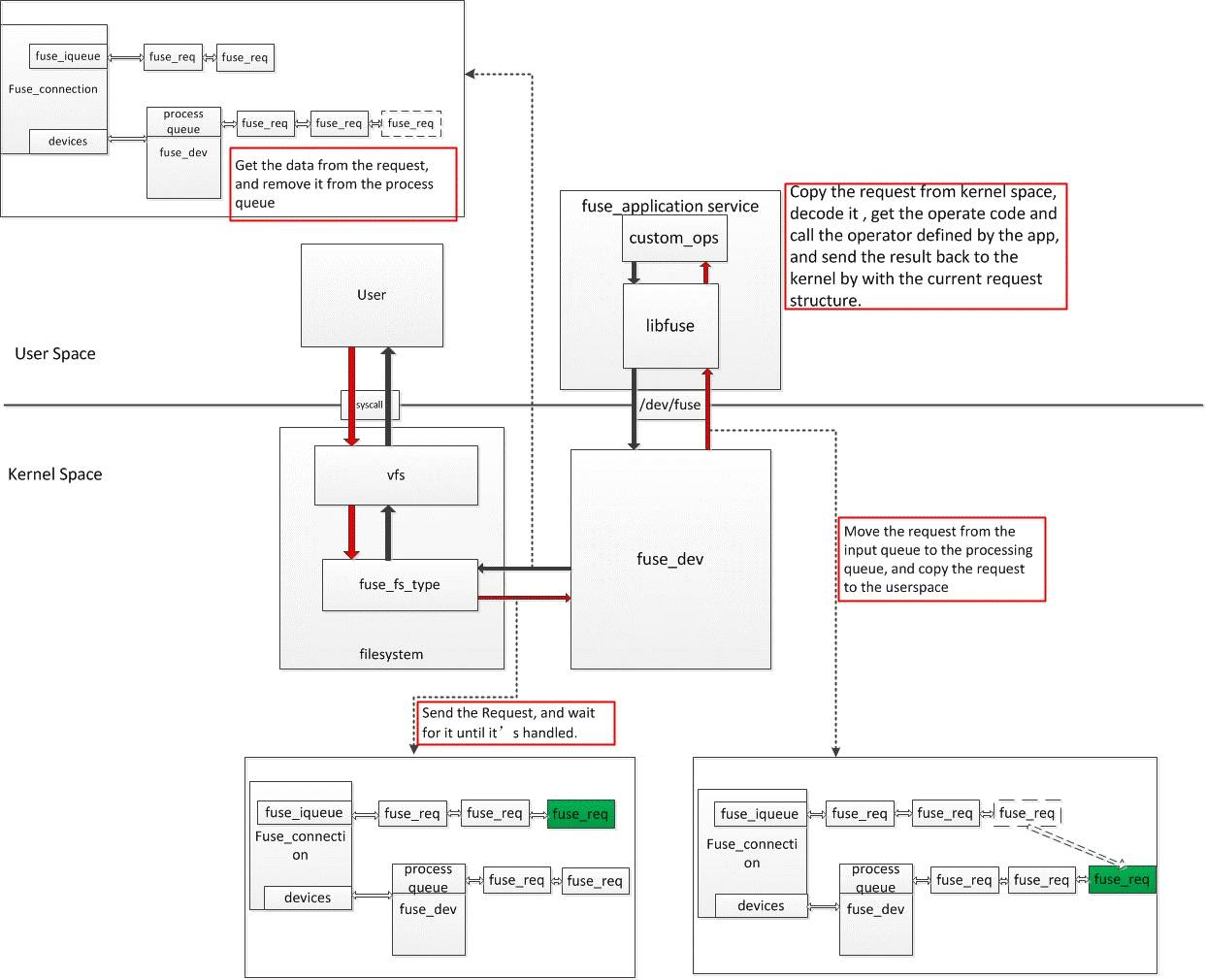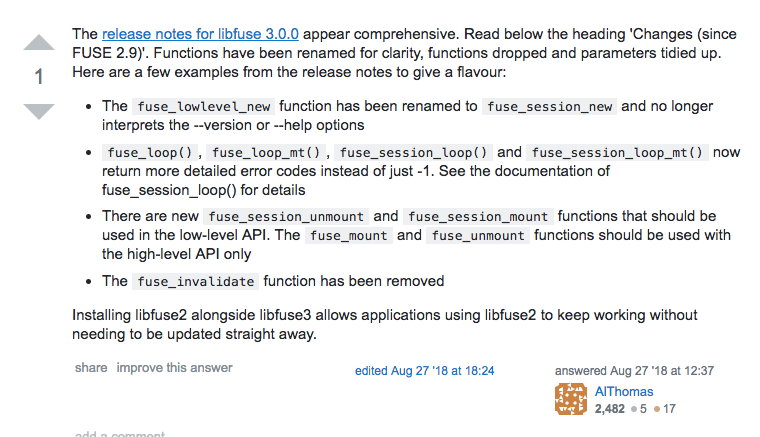FUSE 用户空间文件系统 (Filesystem in Userspace)
FUSE 仓库 Wiki Fuse内核说明文档 FUSE系统IO模式 FUSE 性能评测 # 2022年01月25日18:28:32 修
关于Fuse文件系统:
FUSE (Filesystem in Userspace) is an interface for userspace programs to export a filesystem to the Linux kernel. The FUSE project consists of two components: the fuse kernel module (maintained in the regular kernel repositories) and the libfuseuserspace library (maintained in this repository). libfuse provides the reference implementation for communicating with the FUSE kernel module.
A FUSE file system is typically implemented as a standalone application that links with libfuse. libfuse provides functions to mount the file system, unmount it, read requests from the kernel, and send responses back. libfuse offers two APIs: a "high-level", synchronous API, and a "low-level" asynchronous API. In both cases, incoming requests from the kernel are passed to the main program using callbacks. When using the high-level API, the callbacks may work with file names and paths instead of inodes, and processing of a request finishes when the callback function returns. When using the low-level API, the callbacks must work with inodes and responses must be sent explicitly using a separate set of API functions.
FUSE 宏观调用:
以open为例,整个调用的过程如下:
1- 用户态app调用glibc open接口,触发sys_open系统调用。
2- sys_open 调用fuse中inode节点定义的open方法。
3- inode中open生成一个request消息,并通过/dev/fuse发送request消息到用户态libfuse。
4- Libfuse调用fuse_application用户自定义的open的方法,并将返回值通过/dev/fuse通知给内核。
5- 内核收到request消息的处理完成的唤醒,并将结果放回给VFS系统调用结果。
6- 用户态app收到open的返回结果。

FUSE 包含两个大的发行版本:fuse2 和 fuse3 ,那么fuse2 和 fuse3之间有什么区别呢?(What exactly is the difference between fuse2 and fuse3?)

FUSE 安装
FUSE 安装分为两种方式,一种是 编译安装,另外一张是通过包管理软件(YUM)进行安装。编译安装按照官方教程安装即可。
我使用的操作系统是 Fedora 29, 所以尝试使用yum进行安装:
首先使用rpm 命令查一下当前系统是否已经安装了fuse:
[root@docker 4.19.13-300.fc29.x86_64]# rpm -aq | grep fuse fuse-common-3.2.3-14.fc29.x86_64 fuse-2.9.7-14.fc29.x86_64 fuse-libs-2.9.7-14.fc29.x86_64 glusterfs-fuse-5.2-1.fc29.x86_64 gvfs-fuse-1.38.1-1.fc29.x86_64 zfs-fuse-0.7.2.2-6.fc27.x86_64
可见已经安装好了,当前系统中使用的是fuse的2.9.7版本,并且是有相应的库。所以算是已经安装好了。如果系统中没有上述安装包,可以使用yum进行安装。
[root@docker 4.19.13-300.fc29.x86_64]# yum search fuse Last metadata expiration check: 1:10:16 ago on Sat 12 Jan 2019 10:13:49 PM CST. ============================================================================ Summary & Name Matched: fuse ============================================================================ fuse.x86_64 : File System in Userspace (FUSE) v2 utilities fuse.x86_64 : File System in Userspace (FUSE) v2 utilities fuse-libs.x86_64 : File System in Userspace (FUSE) v2 libraries fuse-libs.i686 : File System in Userspace (FUSE) v2 libraries fuse-libs.x86_64 : File System in Userspace (FUSE) v2 libraries fuse3-libs.i686 : File System in Userspace (FUSE) v3 libraries fuse3-libs.x86_64 : File System in Userspace (FUSE) v3 libraries fuse-devel.i686 : File System in Userspace (FUSE) v2 devel files fuse-devel.x86_64 : File System in Userspace (FUSE) v2 devel files fuse3-devel.i686 : File System in Userspace (FUSE) v3 devel files fuse3-devel.x86_64 : File System in Userspace (FUSE) v3 devel files fuse-common.x86_64 : Common files for File System in Userspace (FUSE) v2 and v3 fuse-common.x86_64 : Common files for File System in Userspace (FUSE) v2 and v3
通过自己的需求,安装对应版本的安装包:fuse-common.x86_64 这个软件包在v2和v3两个版本中都能进行使用。当然你也可以查看包里的内容,进一步了解fuse的组成。
fuse 的内核模块也已经内置到操作系统内核之中了:
[root@docker fuse]# pwd /lib/modules/4.19.10-300.fc29.x86_64/kernel/fs/fuse [root@docker fuse]# ls fuse.ko.xz
为了能够开发属于自己的文件系统,还要安装fuse开发包:
fuse-devel.x86_64 : File System in Userspace (FUSE) v2 devel files
Name : fuse-devel Version : 2.9.7 Release : 14.fc29 Arch : x86_64 Size : 36 k Source : fuse-2.9.7-14.fc29.src.rpm Repo : fedora Summary : File System in Userspace (FUSE) v2 devel files URL : http://fuse.sf.net License : LGPLv2+ Description : With FUSE it is possible to implement a fully functional filesystem in a : userspace program. This package contains development files (headers, : pgk-config) to develop FUSE v2 based applications/filesystems.
我们从包描述可以看到,包中包括了一些开发所需要一些头文件, 动态链接库(.so),pgk-config 文件等。
FUSE 简单使用(DEMO)
high-level API:
/* FUSE: Filesystem in Userspace Copyright (C) 2001-2007 Miklos Szeredi <miklos@szeredi.hu> This program can be distributed under the terms of the GNU GPL. See the file COPYING. gcc -Wall hello.c `pkg-config fuse --cflags --libs` -o hello */ #define FUSE_USE_VERSION 26 //先定义, fuse.h中有判断 #include <fuse.h> #include <stdio.h> #include <string.h> #include <errno.h> #include <fcntl.h> static const char *hello_str = "Hello World!\n"; static const char *hello_path = "/hello"; // 与函数stat()类似,用于得到文件属性,并将其存入到结构体struct stat当中 struct stat *stbuf static int hello_getattr(const char *path, struct stat *stbuf) { int res = 0; memset(stbuf, 0, sizeof(struct stat)); // 使用memset进行初始化结构体 if (strcmp(path, "/") == 0) { stbuf->st_mode = S_IFDIR | 0755; // S_IFDIR 用于说明 / 为目录 stbuf->st_nlink = 2; } else if (strcmp(path, hello_path) == 0) { stbuf->st_mode = S_IFREG | 0444; // S_IFREG 用于说明/hello 为常规文件 stbuf->st_nlink = 1; stbuf->st_size = strlen(hello_str); // 设置文件长度为hello_str的长度 } else res = -ENOENT; // 返回错误信息,没有该文件或者目录 return res; // 成功执行的时候,此函数返回值为 0 } // 该函数用于读取目录中的内容,并在/目录下增加了. .. hello 三个目录项 static int hello_readdir(const char *path, void *buf, fuse_fill_dir_t filler, off_t offset, struct fuse_file_info *fi) { (void) offset; (void) fi; if (strcmp(path, "/") != 0) return -ENOENT; /* fill, 其作用是在readdir函数中增加一个目录项 typedef int (*fuse_fill_dir_t) (void *buf, const char *name, const struct stat *stbuf, off_t off); */ filler(buf, ".", NULL, 0); filler(buf, "..", NULL, 0); filler(buf, hello_path + 1, NULL, 0); //指针+1(/hello), 即增加 hello 目录项,去掉前面的'/' return 0; } // 打开文件函数 static int hello_open(const char *path, struct fuse_file_info *fi) { if (strcmp(path, hello_path) != 0) return -ENOENT; if ((fi->flags & 3) != O_RDONLY) return -EACCES; return 0; } // 读文件函数 static int hello_read(const char *path, char *buf, size_t size, off_t offset, struct fuse_file_info *fi) { size_t len; (void) fi; if(strcmp(path, hello_path) != 0) return -ENOENT; len = strlen(hello_str); if (offset < len) { if (offset + size > len) size = len - offset; memcpy(buf, hello_str + offset, size); } else size = 0; return size; } // 注册自定义函数 static struct fuse_operations hello_oper = { .getattr = hello_getattr, .readdir = hello_readdir, .open = hello_open, .read = hello_read, // 读文件函数 }; // 调用 fuse_main , 把控制权交给了fuse int main(int argc, char *argv[]) { return fuse_main(argc, argv, &hello_oper, NULL); }
执行:
挂载:
[root@docker example]# mkdir /tmp/fuse
[root@docker fuse-example]# ./hello /tmp/fuse/ [root@docker fuse-example]# cd /tmp/fuse/
读取文件属性: [root@docker fuse]# ll total 0 -r--r--r--. 1 root root 13 Jan 1 1970 hello 读取目录属性: [root@docker tmp]# ll /tmp/ total 4 drwxr-xr-x. 2 root root 0 Jan 1 1970 fuse
卸载:
[root@docker tmp]# fusermount -u /tmp/fuse
[root@docker tmp]# ls /tmp/fuse/
当然你也可以修改代码,对fuse的特性进一步尝试。
low-level API: low-level api 相对于 high-level api 来说,有更好的自由度;high-level相对于 low-level api 则有更简单的api使用,如果阅读过fuse源码过后,使用low-level api将使得可控性更强。下面是hello.c 的low-level api 版本
/* FUSE: Filesystem in Userspace Copyright (C) 2001-2007 Miklos Szeredi <miklos@szeredi.hu> This program can be distributed under the terms of the GNU GPL. See the file COPYING. gcc -Wall hello_ll.c `pkg-config fuse --cflags --libs` -o hello_ll */ #define FUSE_USE_VERSION 26 #include <fuse_lowlevel.h> #include <stdio.h> #include <stdlib.h> #include <string.h> #include <errno.h> #include <fcntl.h> #include <unistd.h> #include <assert.h> static const char *hello_str = "Hello World!\n"; static const char *hello_name = "hello"; static int hello_stat(fuse_ino_t ino, struct stat *stbuf) { stbuf->st_ino = ino; switch (ino) { case 1: stbuf->st_mode = S_IFDIR | 0755; stbuf->st_nlink = 2; break; case 2: stbuf->st_mode = S_IFREG | 0444; stbuf->st_nlink = 1; stbuf->st_size = strlen(hello_str); break; default: return -1; } return 0; } static void hello_ll_getattr(fuse_req_t req, fuse_ino_t ino, struct fuse_file_info *fi) { struct stat stbuf; (void) fi; memset(&stbuf, 0, sizeof(stbuf)); if (hello_stat(ino, &stbuf) == -1) fuse_reply_err(req, ENOENT); else fuse_reply_attr(req, &stbuf, 1.0); } static void hello_ll_lookup(fuse_req_t req, fuse_ino_t parent, const char *name) { struct fuse_entry_param e; if (parent != 1 || strcmp(name, hello_name) != 0) fuse_reply_err(req, ENOENT); else { memset(&e, 0, sizeof(e)); e.ino = 2; e.attr_timeout = 1.0; e.entry_timeout = 1.0; hello_stat(e.ino, &e.attr); fuse_reply_entry(req, &e); } } struct dirbuf { char *p; size_t size; }; static void dirbuf_add(fuse_req_t req, struct dirbuf *b, const char *name, fuse_ino_t ino) { struct stat stbuf; size_t oldsize = b->size; b->size += fuse_add_direntry(req, NULL, 0, name, NULL, 0); b->p = (char *) realloc(b->p, b->size); memset(&stbuf, 0, sizeof(stbuf)); stbuf.st_ino = ino; fuse_add_direntry(req, b->p + oldsize, b->size - oldsize, name, &stbuf, b->size); } #define min(x, y) ((x) < (y) ? (x) : (y)) static int reply_buf_limited(fuse_req_t req, const char *buf, size_t bufsize, off_t off, size_t maxsize) { if (off < bufsize) return fuse_reply_buf(req, buf + off, min(bufsize - off, maxsize)); else return fuse_reply_buf(req, NULL, 0); } // 读取文件夹目录 static void hello_ll_readdir(fuse_req_t req, fuse_ino_t ino, size_t size, off_t off, struct fuse_file_info *fi) { (void) fi; if (ino != 1) fuse_reply_err(req, ENOTDIR); else { struct dirbuf b; memset(&b, 0, sizeof(b)); dirbuf_add(req, &b, ".", 1); dirbuf_add(req, &b, "..", 1); dirbuf_add(req, &b, hello_name, 2); reply_buf_limited(req, b.p, b.size, off, size); free(b.p); } } // 处理打开操作函数,检查权限 static void hello_ll_open(fuse_req_t req, fuse_ino_t ino, struct fuse_file_info *fi) { if (ino != 2) fuse_reply_err(req, EISDIR); else if ((fi->flags & 3) != O_RDONLY) fuse_reply_err(req, EACCES); else fuse_reply_open(req, fi); } // 读取函数 返回 hello_str 中的值 static void hello_ll_read(fuse_req_t req, fuse_ino_t ino, size_t size, off_t off, struct fuse_file_info *fi) { (void) fi; assert(ino == 2); reply_buf_limited(req, hello_str, strlen(hello_str), off, size); } // 注册的自定义函数 static struct fuse_lowlevel_ops hello_ll_oper = { .lookup = hello_ll_lookup, .getattr = hello_ll_getattr, .readdir = hello_ll_readdir, .open = hello_ll_open, .read = hello_ll_read, }; int main(int argc, char *argv[]) { // FUSE_ARGS_INIT 本身是一个宏函数,用于生成 struct fuse_args 结构体, 结构体在源代码 fuse_opt.h 文件建中定义; struct fuse_args args = FUSE_ARGS_INIT(argc, argv); // A communication channel, providing hooks for sending and receiving* messages struct fuse_chan *ch; // 与 fuse 中 session 相关, 在源代码 fuse_session.c 中进行定义 一个channel char *mountpoint; // 一个字符串指针 int err = -1; // 错误返回值,默认的返回值为 -1 // fuse_parse_cmdline 是解析命令行参数的一种工具类,他可以解析fuse本身自身的选项,第一个出现的非选项参数被认为是挂载点 // 如果出现多个非选项参数,则认为是错误! if (fuse_parse_cmdline(&args, &mountpoint, NULL, NULL) != -1 && // 挂载, 调用了底层的 fuse_mount_common 函数 (ch = fuse_mount(mountpoint, &args)) != NULL) { struct fuse_session *se; // 创建一个session se = fuse_lowlevel_new(&args, &hello_ll_oper, sizeof(hello_ll_oper), NULL); if (se != NULL) { if (fuse_set_signal_handlers(se) != -1) { fuse_session_add_chan(se, ch); err = fuse_session_loop(se); // 处理信息 fuse_remove_signal_handlers(se); fuse_session_remove_chan(ch); } fuse_session_destroy(se); } fuse_unmount(mountpoint, ch); } // 释放参数占用的空间 fuse_opt_free_args(&args); return err ? 1 : 0; }
执行:(同样执行和High-level API 相同的操作进行验证)
上面第二部分代码,在当时书写时因对底层理解较浅,只是进行了简要的注释。后期做项目的时候,也未对 low-level 的api进行使用,所以这里我就不进行补充了。# 2022年01月25日18:33:58
FUSE 文件系统 example部分 源码注释 (libfuse 2.9.9)
资源来源自网络,保持更新,转载请注明出处。https://www.cnblogs.com/xuyaowen/p/fuse.html




【推荐】还在用 ECharts 开发大屏?试试这款永久免费的开源 BI 工具!
【推荐】国内首个AI IDE,深度理解中文开发场景,立即下载体验Trae
【推荐】编程新体验,更懂你的AI,立即体验豆包MarsCode编程助手
【推荐】抖音旗下AI助手豆包,你的智能百科全书,全免费不限次数
【推荐】轻量又高性能的 SSH 工具 IShell:AI 加持,快人一步